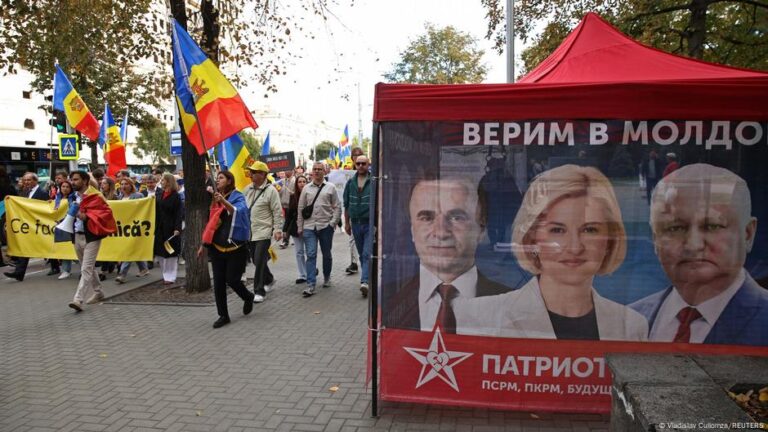WATCH — Moldova’s Gagauzia at a crossroads between East and West
Ahead of the parliamentary election on September 28, DW asked some locals in the largely pro-Russian Autonomous Territorial Unit of Gagauzia how they see their future.
In the early 1990s, the region of Gagauzia made a push for independence, which ended when the Moldovan government granted it extensive autonomy in 1994.
Unlike the rest of Moldova, where Romanian is the main language, many people here speak Russian and consume Russian-language media — giving them strong cultural ties to Moscow.
https://p.dw.com/p/51BEw
September 28, 2025
Polls open in Moldova
Polls have opened at voting stations around Moldova. Voting is scheduled to finish at 9 p.m. local time (0600 GMT/UTC).
https://p.dw.com/p/51BFC
September 28, 2025
Two pro-Russian parties banned ahead of Moldova’s election
Moldova’s Central Electoral Commission excluded the pro-Russia party Greater Moldova (Moldova Mare) from participating in Sunday’s parliamentary vote.
The commission said that the Greater Moldova party was excluded following findings that the party was using illegal financing and foreign funding.
Greater Moldova leader Victoria Furtuna said she would appeal the biased decision, the Moldpress media outlet reported.
The decision was made late on Friday. It is the second pro-Russian party to be disqualified amid concerns over alleged Russian interference.
Earlier on Friday, Moldova’s election authority banned the Heart of Moldova party, which was part of the Russia-friendly Patriotic Electoral Bloc (BEP) — one of the main opponents of the ruling Party of Action and Solidarity (PAS).
https://p.dw.com/p/51BEr
September 28, 2025
Moldovan president warns of Russian interference to sway election
Ahead of Sunday’s vote, Moldova’s pro-EU President Maia Sandu warned of heavy Russian interference.
In an interview released on Saturday, Sandu told German public broadcaster ZDF that the country’s territorial “integrity and independence” are at stake.
According to Sandu, Moscow is exerting enormous pressure to influence the vote, spending “hundreds of millions of euros” to finance political parties, bribe voters and train young people for destabilizing activities.
Polls indicate that Sandu’s pro-EU Party of Action and Solidarity (PAS) is likely to remain the strongest force, though the party may lose the majority it has held since 2021. Pro-Russian parties are also projected to perform well.
Sandu noted that Chisinau is on a promising path towards EU membership. “We have made great progress in the past three years. I truly believe that the Republic of Moldova can be an EU member by the end of the decade,” she told ZDF.
She said she would “continue fighting for democracy” even if the pro-EU camp loses Sunday’s election.
https://p.dw.com/p/51BEq
WATCH — Fact check: How fake news threatens Moldova’s election
As voters in Moldova head to the polls, disinformation and propaganda campaigns are surging online, threatening its EU prospects and testing the strength of its democracy. Moldova is torn politically between Brussels and Moscow. Meanwhile, Russian officials are already throwing shade, calling Moldova’s democracy ”rock bottom.”
Fake news, twisted anti-EU narratives and online propaganda — all trying to steer Moldova’s future.
So, let’s break down the following 3 false narratives you’ll see popping up:
1. Is Moldova suppressing the opposition?
2. False narratives about the EU in Moldova
3. Is NATO dragging Moldova into war?
https://p.dw.com/p/51BEu
Welcome to our coverage
Landlocked between Ukraine and European Union member Romania, Moldova is set to elect a new parliament on Sunday.
The small republic, home to around 2.4 million people, has spent recent years on a path toward the EU. Moldova has been an EU candidate country since 2022.
Sunday’s ballot is considered pivotal for the future of the former Soviet republic. It will determine whether Moldova’s pro-European course continues or if Chisinau is drawn back into Russia’s orbit.
On Friday, President Maia Sandu described the election as the “most consequential” in the country’s modern history.
Polling booths open at 7 a.m. local time (0400 GMT/UTC) and close at 9 p.m. DW will bring you the latest developments on the high-stakes vote in Moldova.
https://p.dw.com/p/51BDv


